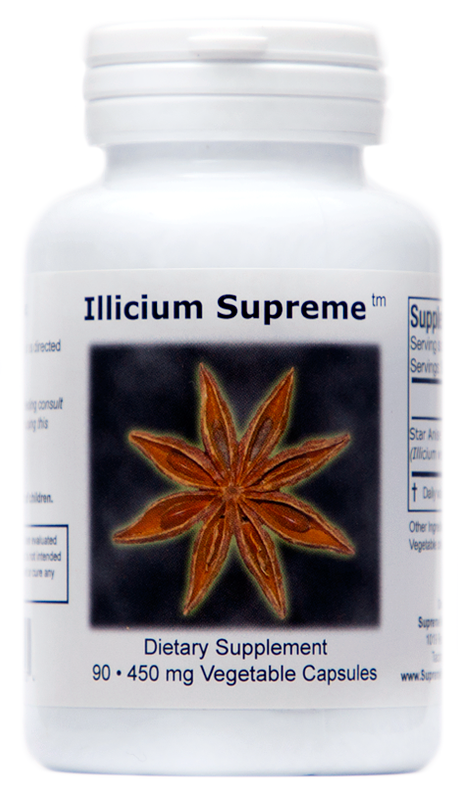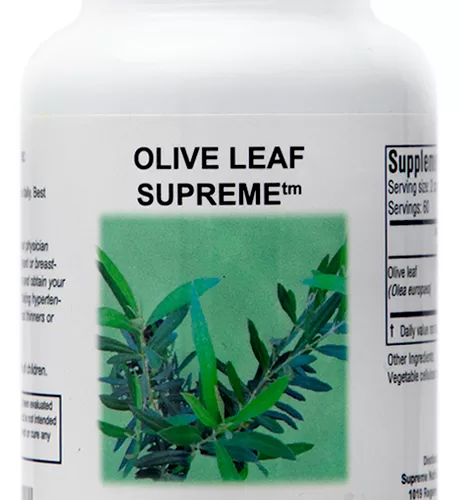Description
Illicium Supreme™ is the fruit of a tropical evergreen tree, Illicium verum. Both the roots and fruit have been used as medicine and, in recent years, have been further investigated for their medicinal potential. Traditionally, star anise (Illicium) was used to treat nausea, indigestion, expel gas, relieve colic, reduce hernias[i], increase milk production in nursing mothers, facilitate birth, and increase libido. In Traditional Chinese Medicine, it has been used to treat prolapsed organs, treat kidney deficiency, and to bring warmth and vitality to the stomach and intestines. We had to test samples from a number of different suppliers to find one that met our quality standards.
Illicium is rich in essential oils including anethole, safrole, cineole, pinene, and limonine[ii]. Additionally, it is rich in shikimic acid, the precursor molecule used to produce the antiviral drug Tamiflu. Illicium is also an antioxidant, and has pain relieving and sedative effects[iii]. The essential oil of Illicium has been shown in studies to be potently antifungal[iv]. Additionally, extracts of Illicium have been shown to be extremely effective against antibiotic resistant strains of bacteria including MRSA[v] and there have been studies demonstrating strong inhibitory effects against malaria[vi].
Illicium has also been shown to have anticholinesterase effects, the same mechanism of action as some Alzheimer’s drugs[vii]. It has been shown to reduce brain ischemia and brain edema, further suggesting neuroprotective effects[viii][ix]. In one recent study, one of the components of Illicium was shown to enhance glutathione and decrease the macroscopic damage of colitis in rats[x]. Illicium is very anti-inflammatory for GI conditions like colitis[xi]. Antiplatelet and antithrombotic effects have also been demonstrated, suggesting cardiovascular benefits[xii]. Some websites also cite Illicium as being a possible treatment for declining male hormones in old age[xiii].
From my experience, Illicium has been a great product for most patients as evaluated by applied kinesiology. It often negates positive tests to composite microbial vials and it strengthens the majority of patients “in the clear”. It seems to strengthen the adrenals, improve digestive function (possibly increasing enzyme production), and build/balance the immune system. Illicium has a lot of applications for decreasing inflammation in the GI tract and also helps the cardiovascular system and brain (see above citations). I therefore consider this to be a supreme tonifying agent and extremely useful for treating acute illness. Due to its specific chemical makeup it has strong antiviral effects and I feel it has great potential for both treating and preventing the various viruses including influenza. Lastly I feel this is an excellent antinausea medicine with thousands of years of safe use.
We test it on every patient due to the large number of potentially positive effects including anti-microbial effects and multiple organ support.
Recommended dose for acute illness: 2 capsules three times daily
Recommended dose for maintenance/prevention: 1 capsule twice daily
*There have been many case reports of children being poisoned with star anise/Illicium verum. Invariably these reports involve adulteration with Japanese star anise (Illicium anisatum), which contains toxic compounds. Chinese Star Anise (this product) has had centuries of safe use.
[i]
[i] Planetary Herbology by Michael Tierra, Lotus Press, 1992.
[ii]
[ii] Planetary Herbology by Michael Tierra, Lotus Press, 1992.
[iii]
[iii] J Ethnopharmacol. 2011 Jun 14;136(1):10-20. Epub 2011 Apr 29.
[iv]
[iv] Molecules. 2010 Oct 27;15(11):7558-69.
[v]
[v] J Med Food. 2010 Oct;13(5):1254-62.
[vi]
[vi] Antimicrob Agents Chemother. 1999 Jan;43(1):175-7.
[vii]
[vii] Fitoterapia. 2011 Apr;82(3):342-6. Epub 2010 Nov 12.
[viii]
[viii] Effect of 3,4-oxo-isopropylidene shikimic acid on brain edema and energy metabolism in rats subjected to middle cerebral artery thrombosis, WANG Hong-Tao, SUN Jian-Ning, XU Qiu-Ping, GUO Ya-Jian Chinese Journal of Pharmacology and Toxicology 2002-04
[ix]
[ix] Zhongguo Yao Li Xue Bao. 1999 Aug;20(8):701-4.
[x]
[x] Dig Dis Sci. 2012 Apr 3. [Epub ahead of print]
[xi]
[xi] Inflammation. 2012 Jul 25. [Epub ahead of print]
[xii]
[xii] J Cardiovasc Pharmacol. 2002 Feb;39(2):262-70.
[xiii]
[xiii] Therapeutic Research


